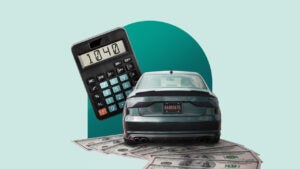Is car loan interest tax deductible?

Key takeaways
- Auto loan interest is deductible from 2025 to 2028 on qualified vehicles that are used for personal, non-commercial purposes.
- Car loan interest is also deductible in certain situations where you use your vehicle for business or self-employment.
- You will need to keep detailed records to prove your business use when you file your taxes.
Traditionally, the only way to deduct your car loan interest was through the standard mileage deduction. This rate, set by the IRS, allows small business owners and those who are self-employed to write off some of the costs associated with operating a vehicle for business purposes.
For the next four years, you may be eligible for a tax deduction of up to $10,000 when you borrow a new auto loan for a qualifying car. This temporary tax deduction was passed in July 2025 and applies to new vehicles purchased between January 2025 and December 2028. There are a few drawbacks to this new legislation, and only a handful of purchases will qualify for the full deduction.
When can you deduct car loan interest from your taxes?
Generally, car loan interest is only deductible for business vehicles. However, new legislation has made it possible to deduct auto loan interest from your taxes if you purchase a qualifying vehicle within the next four years.
Bankrate staff insights
Personal Use
A new tax deduction on auto loan interest was included as part of many pieces of legislation in the One Big Beautiful Bill. This is a temporary deduction for vehicles purchased between 2025 and 2028, and it applies retroactively to the start of 2025. This deduction allows buyers to deduct up to $10,000 in auto loan interest annually if they meet the income requirements and their car meets certain eligibility requirements.
Additionally, your car must have undergone final assembly in the United States to qualify for this deduction. You can check the final assembly of a vehicle by checking its dealership label or by searching the National Highway Traffic Safety Administration (NHTSA) website’s VIN Decoder.
Business use
If you are self-employed or own a business and use a vehicle for business purposes, you may claim a tax deduction for car loan interest. If you are an employee of someone else’s business, you cannot claim this deduction.
If the vehicle in question is used for both business and personal needs, claiming this tax deduction is slightly more complicated. You must determine the percentage of time the vehicle is driven for business needs versus personal needs and apply that calculation to the loan interest deduction being claimed on your tax returns.
For instance, if you use the vehicle 50 percent of the time for business reasons, you can only deduct 50 percent of the loan interest on your tax returns. If you pay $1,000 in interest on your car loan annually, this means you can only claim a $500 deduction.
On the other hand, if the car is used entirely for business purposes, the full amount of interest can be written off.
What documentation do you need to claim car loan interest tax deductions?
Documenting personal use
To claim the new tax deduction for American-made vehicles, you will need to keep:
- Your signed loan agreement.
- Vehicle purchase documents, such as the bill of sale, vehicle title, finance agreement or odometer disclosure statement.
- The Vehicle Identification Number (VIN).
- Your end-of-year lender statement, which is a new form and will likely be similar to a 1098.
Documenting business use
When claiming deductions of any kind on your tax returns, it’s best to keep detailed records and supporting documentation. You need to be able to verify all expenses in case there are any questions or an audit.
- A log or record of all trips taken in the vehicle for business purposes, including a log of the odometer mileage.
- Car loan payment records verifying the interest paid.
- Vehicle maintenance and visits to the mechanic.
- Receipts for tolls and parking fees.
Although you cannot write off parking or tolls as part of the auto loan interest deduction, they are legitimate car expenses that can be deducted when used for business. It will also help support your claim that the vehicle was used for business purposes.
Keep supporting documentation for your tax returns for at least three years from the date you file the tax return. This includes vehicle maintenance records, receipts from tolls and parking and any log or record of trips taken.
How to write off car loan interest
Claiming personal use write off
Lenders will be required to issue statements showing the amount of interest you have paid during the year for qualifying vehicle purchases. This may be an IRS Form 1098 or a new, similar form. It’s recommended that you keep monthly statements from your lender as well.
You will need to provide your car’s VIN. The VIN can be used to check that your vehicle’s final assembly was completed in the U.S., so it will be required to qualify. And unlike most other deductions, itemizing is not required to claim this deduction.
Claiming business use write off
You can opt for the standard deduction, mileage rate deduction or the actual vehicle expense deduction. The better option will depend on how frequently you use your vehicle for business. If your total vehicle expenses for business — including interest — are more than the standard mileage deduction, then it may be worth a line-by-line approach.
However, the approach you take will depend on how you previously filed taxes. In order to submit actual expenses, you will need to do this every year. Talk to a tax professional if you haven’t filed as a business before. They will be able to guide you on the best way to file for the entire length of your loan or lease.
Like other business expenses, listing your expenses will be done in Form 1040 Schedule C. The IRS provides instructions on what other information you may need to submit, as well as how to calculate your deductions.
Bankrate staff insights
If you’re unsure, hire a professional
It’s best to consult a professional if:
- You’re uncertain about whether you qualify for the car loan interest deduction.
- You’re unsure about how to properly calculate the exact amount of the deduction to be claimed on your tax filing.
A tax expert can help guide you through the process and determine whether the deduction makes sense for your unique circumstances.
For instance, when you use the vehicle for business and personal uses, it may not make sense to claim the auto loan interest deduction if business-related use of the vehicle is minimal.
Claiming this deduction may be more effort than it is worth if you use the vehicle for business purposes less than 50 percent of the time.
Bottom line
For a limited time, you can write off car loan interest for personal cars if you buy a new, American-made vehicle. While this deduction may not be large enough to sway your purchase decision, it can be a nice bonus if the vehicle you plan to purchase qualifies. Still, the best way to save is to compare auto loan rates.
Deducting car loan interest on your tax returns can also be a valuable write-off if you’re a small business owner or you’re self-employed. But before you claim this deduction, be sure you qualify. Work with a tax professional if you’re uncertain about how to calculate the exact amount you may be eligible to claim.
Why we ask for feedback Your feedback helps us improve our content and services. It takes less than a minute to complete.
Your responses are anonymous and will only be used for improving our website.
You may also like

What is a precomputed interest car loan?

Does refinancing a car start your loan over?






